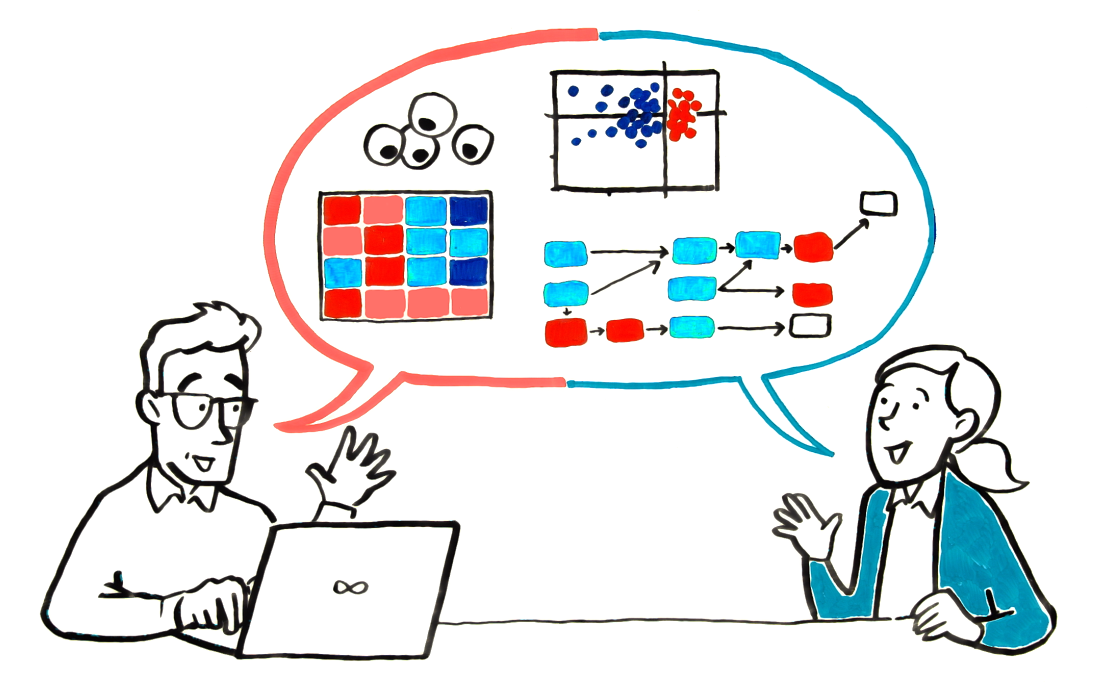The benefits of a bioinformatics consulting session
You are the expert in your field. Your time is valuable. You are more than capable of publishing papers by yourself. However, our experience has shown that there are clear benefits in planning omics experiments – and their analyses – with an expert bioinformatician. Genevia Technologies’ bioinformatics consultants have been circling the globe since next-gen sequencing became widely available for experimental biology research groups. Hundreds of meetings with world-leading PIs have taught us a thing or two about how bioinformatics can optimally support the experimental biology process.
Skip the sales meeting and talk to a scientist
We believe that only scientists can offer the best research services to other scientists. In our case, it is bioinformatics scientists who offer our data analysis services to experimental bioscientists. Therefore your very first meeting with us is a scientist-to-scientist discussion about your current or next project, and how recent advances in bioinformatics can help you tease out that next big discovery from the massive data sets resulting from an omics experiment. In exploratory research this means prioritization of standard analyses with which to gather information, and then offering an expert opinion on how to integrate the resulting observations into a coherent and compelling science story. In hypothesis-driven research, you can learn how to leverage the latest gold standard methods in order to validate your hypotheses in the most accurate way possible, making the journey of publishing your paper as smooth as possible.
Every research project is unique; however, the bioinformatics consulting projects that we work on with our clients do also have common elements. This enables us to quickly grasp the essence of your research even with its unique aspects. We can then propose analyses that PIs with similar data sets have benefited from in previous projects. We approach all of our projects as a scientific collaboration: you are the subject matter, the expert in the biological system which we are studying, and our role is to provide you with our technical expertise. This expertise is a combination of bioinformatics consulting and analysis of your data - not to the level of a p-value table, but to the level of a complete publication. Once you have introduced the biological basis for your research to our bioinformatics specialist, they will help you to translate your broader hypothesis into smaller analytical tasks that will make your project much more workable using data analysis.
With this blog post, we wanted to give you a few practical ideas on how you can benefit from having a meeting with our bioinformatics experts. Naturally, the scientific scope of the meeting will vary depending on the current stage of your omics project. Here we share our insights on the three types of case that we encounter most often:
Case 1: You are planning to include omics experiments in your next grant application
Great timing! This is the best possible moment to start accumulating outside expertise on how to design an omics experiment in a way that optimally supports your study. We often meet scientists who have more or less completed their previous research cycle and are about to start a new one with a fresh grant application. At this stage, the scientist will benefit from learning about the common pitfalls in the experiment design: What is the optimal number of replicates? What kind of controls will I need? How should I set up my time points in order to infer gene regulatory networks from my cardiac cell differentiation experiments? As you might imagine, not focusing on questions like these may jeopardize your entire study; even the most prestigious bioinformatics team in the world will not be able to salvage a poorly designed study through computer skills alone.
We often work with experimental biologists to create grant applications where the biology and the bioinformatics are balanced and integrated components of the study. In addition to helping you design experiments that seasoned grant reviewers can support, a bioinformatics expert will advise you in selecting the omics experiments best suited for the study. This can lead to significant cost savings as you won’t end up paying for unhelpful data (for example, think of doing away with exome sequencing of the key samples compared to full genome sequencing of many redundant samples), or even worse, creating false economies and, as a result, compromising the entire application!
Initially, you may only need a top-level discussion on the required bioinformatics analysis workflow – a one-hour investment that will surely pay off. Subsequently, after the first meeting you can decide whether you would like to bring our bioinformatics team on board to help with the planning and writing of the data analysis section in the grant application. Our experience reassures us that this is always a tried-and-tested way to rest easy that bioinformatics won’t be the weakest link in the chain. In either case, we will always be happy to meet up with you to see how we can help with your particular project!
Case 2: You have an unanalyzed omics data set sitting on your desk
We just love the scent of fresh omics data sets! Our bioinformatics experts frequently get requests from researchers who have just received data from an external omics lab. These are pretty straightforward cases: you explain the data set and your goals to us, then we give you our suggestions for the best analysis workflow. A very important aspect of these sessions is that you can use our expertise to address all your key questions: Is it possible to identify DNA polymorphisms from mRNA sequencing data? How can I integrate open chromatin experiments with gene and protein expression? Which publicly available datasets can I leverage to increase the credibility of my findings? We have answered questions like these hundreds of times, and this will also allow you to enrich your original plans with few of our suggestions.
Case 3: You have a range of bioinformatics results, and the next step is to integrate them into a paper
More often than you think, a bioinformatician who started analyzing the incoming data may become unavailable to continue the work, or maybe a collaborator simply ran out of time, and can’t support you as extensively as you would need. You might find yourself staring at tens of randomly named result files, tables with unexplained abbreviations, figures without legends, and a manuscript with an uncertain future ahead of it. Someone needs to come in, collect all the loose ends, and find out how everything fits together. You would be surprised how often we encounter research groups who are stuck in this unfortunate situation. Is it too late at this stage to discuss this sort of project with a bioinformatics expert?
By any measure, this is not an ideal situation to be starting from – and a huge threat to any omics project without adequate bioinformatics planning and support. Our support would begin by carefully collating the available results and then make a plan forward. Sometimes it is best to start over, sometimes another bioinformatician can just step right in and continue, and sometimes you already have what you need – you just need someone to thread the whole story together. Whichever the case, our bioinformatics experts have successfully recovered quite a few papers from this quagmire!
What happens after the meeting? How can I see concrete benefits?
The goal of our initial meetings is to provide you with a small preview of how it would feel to work with us. After the meeting you will also have a better idea of how to best organize the necessary bioinformatics in order to advance the publication of your project. If you decide that you might benefit from having a professional bioinformatics team to support your experimental team, you may request a quotation from the bioinformatics expert. The quotation will contain an estimate for turnaround time, computation requirements and other practical parameters which will allow you to make an informed decision on securing the optimal bioinformatics resources. The key benefit, however, is the written data analysis plan that you can use in order to outline your needs to your collaborator. Alternatively, there is always the option to let us do all the hard work, and enjoy professional bioinformatics services boosting your research output!
We hope that we were able to answer some of the questions that you may have been wondering, and hopefully this article will help you decide whether or not it makes sense for you to have that first discussion with one of our bioinformatics experts. Send us a message if you are interested in learning more about the benefits that bioinformatics consulting can bring to your research project, and we will arrange a video conference with your team in no time!
Leave your email address here with a brief description of your needs, and we will contact you to get things moving forward!


